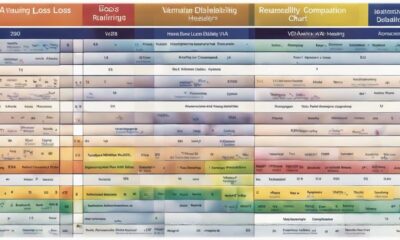Navigating the VA System
VA Rating Criteria for Hearing Loss and Tinnitus
Delve into the intricate VA rating criteria for hearing loss and tinnitus to unravel the mysteries of disability compensation.

Numerous veterans might have to deal with the complex rating guidelines of the VA for hearing loss and tinnitus. Grasping the significance of these evaluations in terms of disability benefits is crucial, yet the details of the guidelines can initially seem confusing.
As we explore the nuances of how the VA determines ratings for these auditory conditions, a clearer picture emerges that sheds light on the complexities veterans face when seeking benefits.
Key Takeaways
- VA uses a scale from 0% to 100% for hearing loss and tinnitus severity ratings.
- Tinnitus is commonly rated at 10%, with higher ratings for more severe cases.
- Combined ratings reflect the impact of both hearing loss and tinnitus on disability compensation.
- Gathering strong evidence and seeking legal assistance can improve chances of securing higher disability ratings.
Understanding VA Rating Criteria Overview
In evaluating hearing loss and tinnitus for disability benefits, the VA utilizes a rating system ranging from 0% to 100% based on the impact these conditions have on daily activities and communication. This rating system is crucial in determining the severity of the hearing loss or tinnitus experienced by veterans.
For instance, veterans with profound hearing loss in both ears can receive a 100% disability rating, signifying the most severe level of impairment. On the other hand, tinnitus is commonly rated at 10%, although this can vary depending on the perceived severity of the condition.
It's important to note that higher disability ratings result in increased monthly compensation for veterans, reflecting the recognition of the challenges they face due to their hearing impairments. Understanding the VA disability rating system is essential for veterans to receive the appropriate support and recognition for their service-related hearing loss and tinnitus.
Hearing Loss Evaluation Process

Transitioning from understanding VA rating criteria to delving into the hearing loss evaluation process, veterans undergo thorough assessments to determine the extent of their impairment and its relation to military service.
The evaluation process for hearing loss involves a series of diagnostic tests aimed at accurately assessing the severity of the impairment and establishing a connection to the veteran's military service.
Some veterans may face challenges in having their VA disability claims approved, especially if they've been denied initially. In such cases, seeking assistance from veteran-owned law firms specialized in handling VA claims can be beneficial.
Furthermore, veterans who've been affected by faulty 3M earplugs during their service may be entitled to compensation for their service-related hearing loss.
It's crucial for veterans to provide detailed documentation of their combat or noise exposure during their military service to support their claims effectively.
Tinnitus Rating Factors
Exploring the factors that influence the rating of tinnitus disability by the VA involves assessing the severity of symptoms and their impact on daily functioning. Tinnitus rating factors include the severity of the condition, its impact on the quality of life, and the veteran's ability to work and perform daily activities.
The VA typically rates tinnitus at 10% disability based on its severity. However, if the tinnitus is particularly debilitating, significantly impairs the veteran's ability to work, or has a substantial negative effect on their quality of life, a higher disability rating may be warranted.
The VA criteria for tinnitus ratings take into account how the condition affects the individual's daily life and functioning. By considering these factors, the VA aims to provide appropriate disability compensation to veterans suffering from tinnitus that significantly hinders their well-being and daily activities.
Combined Ratings for Hearing Loss and Tinnitus

When assessing disability compensation for veterans with both hearing loss and tinnitus, the VA combines the individual ratings for each condition to determine an overall disability rating. This combined rating takes into account the impact of both service-connected hearing loss and tinnitus on the veteran's overall disability. By receiving separate ratings for each condition, veterans can have these ratings combined to establish a total disability rating that reflects the severity of their impairments accurately. This calculation is crucial for maximizing compensation and ensuring that veterans receive the benefits they deserve for the challenges they face due to their hearing loss and tinnitus.
Understanding the intricacies of combined ratings can significantly impact the compensation veterans receive.
The VA's consideration of both hearing loss and tinnitus acknowledges the complex effects these conditions can have on individuals.
Maximizing disability benefits through accurate combined ratings is essential for supporting veterans in their post-service lives.
Appealing VA Disability Ratings
To improve their VA disability ratings, veterans can strategically gather compelling evidence, such as independent medical examination results and testimonials highlighting the impact of hearing loss on daily life. Winning an appeal for a higher VA rating for hearing loss requires presenting detailed exposure history and how it correlates with the hearing impairment.
Appeals can be challenging due to the objective nature of hearing test results, making strong evidence crucial. Testimonials that illustrate the difficulties faced in daily activities due to hearing loss can provide a personal touch to the appeal process.
Veterans seeking a better disability rating may benefit from legal assistance from accredited attorneys who understand the intricacies of VA rating criteria. By presenting a comprehensive case supported by objective medical evaluations and personal narratives, veterans can increase their chances of securing a higher disability rating for hearing loss through the VA appeals process.
Frequently Asked Questions
What Is the VA Rating for Tinnitus and Hearing Loss?
When it comes to the VA rating for tinnitus and hearing loss, the percentages can vary based on severity. Tinnitus is often rated at 10% disability, while hearing loss can range from 0-100% depending on the extent of impairment.
These ratings are determined through VA's impairment chart and test results. In cases of profound deafness in both ears, veterans may qualify for Special Compensation under specific criteria.
What Type of Hearing Loss Does Tinnitus Cause?
When tinnitus is present, it often leads to sensorineural hearing loss, affecting the inner ear's delicate components responsible for sound signal transmission.
This type of hearing loss can diminish our ability to perceive and process external sounds accurately.
The connection between tinnitus and sensorineural hearing loss underscores the importance of recognizing and addressing these issues promptly for improved diagnosis and treatment outcomes.
How Much Compensation Will I Get for Hearing Loss and Tinnitus?
We can determine the compensation for hearing loss and tinnitus by considering the severity and impact on daily life. The amount can range from 10% to 100% based on the level of disability. Veterans with profound hearing loss in both ears may qualify for a 100% rating.
Higher disability ratings result in increased monthly compensation. The compensation can reach thousands of dollars per month depending on the severity of the disability.
What Can Be Done for Hearing Loss and Tinnitus?
For hearing loss and tinnitus, treatment options include:
- Blockage removal
- Corticosteroids
- Hearing aids
- Cochlear implants
- Medications
These interventions aim to improve hearing and manage tinnitus symptoms. Seeking medical evaluation is crucial for proper diagnosis and personalized treatment plans.
Taking proactive steps towards addressing these conditions can lead to improved quality of life and better overall well-being. It's important to consult with healthcare professionals to determine the most suitable course of action.
Conclusion
In conclusion, navigating the VA rating criteria for hearing loss and tinnitus can feel like finding our way through a complex maze. But with patience and perseverance, we can uncover the path to securing the disability benefits we deserve.
Just like a skilled navigator charts a course through turbulent waters, we too can steer through the challenges and reach the peaceful shore of compensation and support.
Jamie is one of the creative forces behind the words that resonate with our audience at Deaf Vibes. With a passion for storytelling and advocacy, Jamie delves into topics that matter deeply to the deaf and hard-of-hearing community. Jamie’s articles are crafted with empathy, insight, and a commitment to positive change, from exploring the latest advancements in hearing technologies to shedding light on the everyday challenges and victories of those within the community. Jamie believes in the power of shared stories to inspire action, foster understanding, and create a more inclusive world for everyone.
Navigating the VA System
Understanding Bilateral Hearing Loss VA Rating Criteria
Yearning for clarity on how the VA evaluates bilateral hearing loss? Uncover the key insights to help veterans navigate the rating criteria maze.

Diving into the specifics of the Bilateral Hearing Loss VA Rating Criteria, we delve into the complex elements that form the basis of disability evaluations for veterans. It’s vital for veterans to grasp the method the VA uses to assess the degree of hearing impairment in both ears as they maneuver through the claims procedure.
By delving into the specific tests used and the range of potential ratings, we gain insight into how to present a strong case for compensation.
Stay tuned as we unravel the complexities of VA rating criteria for bilateral hearing loss, shedding light on the path to securing the benefits our veterans rightfully deserve.
Key Takeaways
- VA rating for bilateral hearing loss based on speech discrimination and pure tone tests.
- Ratings start at 10% and increase with severity, influencing benefits.
- Total hearing loss may qualify for Special Monthly Compensation (SMC).
- Comprehensive evaluation by an audiologist crucial for accurate rating.
Definition of Bilateral Hearing Loss
Bilateral hearing loss is a condition characterized by impairment in both ears, affecting an individual's ability to perceive sounds from various sources. Veterans frequently encounter this condition due to exposure during military service, such as gunfire, explosions, or hazardous environments. Diagnosing bilateral hearing loss necessitates a thorough evaluation by a licensed audiologist, including assessments like speech discrimination and pure tone threshold tests.
To file VA claims for bilateral hearing loss, veterans must establish a clear connection between their current condition and the in-service events that caused or worsened their hearing impairment. The VA rating criteria for bilateral hearing loss are stringent and require specific documentation to determine the severity of the condition accurately.
Understanding the nuances of how bilateral hearing loss is defined and assessed is crucial for veterans navigating the VA claims process to ensure they receive the appropriate recognition and support they deserve for their service-related hearing difficulties.
VA Rating Schedule Overview

When examining the VA Rating Schedule for hearing loss, one must consider specific criteria that evaluate the severity of hearing impairment in both ears. The VA rating schedule utilizes a combination of factors to determine the disability rating for bilateral hearing loss:
- Ratings are based on speech discrimination and pure tone threshold average test results for both ears.
- The VA assigns a Roman numeral designation on a grid chart to establish the disability rating.
- Veterans typically receive a 10% disability rating for bilateral hearing loss, with the potential for higher ratings depending on specific test outcomes.
- Bilateral hearing loss ratings play a crucial role in determining the level of compensation and benefits veterans may receive from the VA.
Understanding these components of the VA rating schedule is essential for accurately assessing the impact of bilateral hearing impairment on veterans' lives and ensuring they receive appropriate compensation and support.
Factors Influencing VA Ratings
Factors influencing VA ratings for hearing loss include a combination of speech discrimination and pure tone threshold average test results for both ears. The severity of bilateral hearing loss in each ear determines the disability rating percentage assigned by the VA.
By combining the ratings for both ears, the VA calculates the overall disability compensation for bilateral hearing loss. If individuals believe they deserve a higher rating, they can submit additional evidence, such as test results from a licensed audiologist, to support their claim.
In cases of total hearing loss in both ears, Special Monthly Compensation (SMC) may be granted in addition to regular disability compensation. Understanding how speech discrimination and pure tone threshold averages impact VA ratings is crucial for veterans seeking fair compensation for their bilateral hearing loss.
Impact of Hearing Loss Severity

The severity of hearing loss directly influences the disability rating assigned by the VA, impacting veterans' benefits and compensation. When evaluating hearing loss severity for VA disability rating purposes, several key factors come into play:
- Ratings are determined based on speech discrimination and pure tone threshold averages.
- More severe hearing loss results in higher disability ratings, potentially leading to increased compensation.
- Bilateral hearing loss in both ears can contribute to a higher disability rating due to the impact on overall hearing ability.
- The assessment of hearing loss severity is typically conducted by a licensed audiologist to ensure accuracy and consistency in determining the appropriate disability rating.
Understanding the implications of hearing loss severity on VA benefits is crucial for veterans, as it directly affects the level of compensation they may receive. For those experiencing significant hearing impairments, the disability rating criteria play a vital role in determining eligibility for additional support, such as unemployability benefits.
Evaluation Process for VA Rating
To evaluate bilateral hearing loss for VA rating, specific tests like the Maryland CNC Test and Pure Tone Audiometric test are utilized, with the VA employing a grid chart to assign a Roman numeral designation based on the degree of hearing impairment. The rating process considers speech discrimination and Puretone threshold averages to assign disability ratings accurately. Veterans must undergo a comprehensive hearing exam conducted by a licensed audiologist for a precise diagnosis. It's crucial to note that diagnoses solely by a primary care doctor are not considered sufficient evidence for VA claims related to hearing loss. Below is a table outlining the evaluation process for VA rating of bilateral hearing loss:
| Evaluation Process | Description | Importance |
|---|---|---|
| Maryland CNC Test | Evaluates speech discrimination ability to understand speech in noise environments. | Critical for VA assessment |
| Pure Tone Audiometric test | Measures hearing sensitivity across different frequencies to determine hearing thresholds. | Essential for rating |
| Comprehensive Hearing Exam | Conducted by a licensed audiologist to assess the full extent of hearing loss and its impact. | Crucial for accurate rating |
Frequently Asked Questions
How Does the VA Calculate Bilateral Hearing Loss?
We calculate bilateral hearing loss by combining results from both ears to determine a single disability rating. This rating is based on the average of pure tone thresholds and speech discrimination scores.
A grid chart assigns a Roman numeral designation according to the severity of the impairment. The most common rating for veterans with bilateral hearing loss is 10%.
Additional evidence can support a higher disability rating when warranted.
How Is Bilateral VA Rating Calculated?
We determine bilateral VA ratings by evaluating the Puretone threshold average and speech discrimination scores for both ears. These test results are combined to assign a single disability rating reflecting the severity of hearing loss in both ears.
Veterans can submit additional evidence to support a higher disability rating. The VA uses a percentage scale to rate bilateral hearing loss, ensuring fair evaluation and appropriate compensation for affected individuals.
What Is Bilateral Mild to Moderate Hearing Loss?
Bilateral mild to moderate hearing loss signifies a condition where both ears exhibit mild to moderate hearing difficulties. This can impede our ability to perceive sounds clearly, especially in noisy settings or conversations. Speech recognition and understanding may also be affected, leading to communication challenges.
Causes can vary from aging to noise exposure or medical issues. Individuals with this condition might find benefit from hearing aids or other assistive devices to enhance their hearing.
What Is the Most Common VA Rating for Hearing Loss?
We often see a 10% VA rating for hearing loss, which is quite common among veterans. This rating is typically given for mild to moderate hearing loss.
It's just one of the many ratings ranging from 0% to 100% based on the severity of the condition. Higher ratings or total hearing loss could lead to additional compensation.
It's important to understand how these ratings are determined for veterans dealing with hearing loss.
Conclusion
In conclusion, the VA rating criteria for bilateral hearing loss is crucial for veterans seeking disability benefits. Understanding the impact of hearing impairment in both ears and the factors influencing VA ratings is key to receiving appropriate compensation.
The evaluation process can be complex, but with the right evidence, veterans can potentially qualify for higher disability ratings.
Stay tuned for more insights on navigating the VA disability benefits system for hearing loss.
Jamie is one of the creative forces behind the words that resonate with our audience at Deaf Vibes. With a passion for storytelling and advocacy, Jamie delves into topics that matter deeply to the deaf and hard-of-hearing community. Jamie’s articles are crafted with empathy, insight, and a commitment to positive change, from exploring the latest advancements in hearing technologies to shedding light on the everyday challenges and victories of those within the community. Jamie believes in the power of shared stories to inspire action, foster understanding, and create a more inclusive world for everyone.
Navigating the VA System
How Does the VA Rate Hearing Loss for Veterans?
Keen to uncover the intricacies behind how the VA rates hearing loss for veterans?

Understanding the process by which the VA evaluates hearing loss for veterans may appear both simple and complex simultaneously.
From understanding the criteria used for evaluating hearing loss severity to uncovering the various factors that impact disability ratings, there's a complexity that demands attention.
Let's explore the nuances of how the VA calculates these ratings and what veterans should be mindful of when navigating this system for their benefit.
Key Takeaways
- VA rates hearing loss based on pure tone threshold tests.
- Disability ratings range from 0 to 100%.
- Severity impacts disability rating, up to 100%.
- Accurate diagnosis by audiologist crucial for VA compensation.
VA Hearing Loss Rating Criteria
When determining VA disability ratings for hearing loss, veterans are evaluated based on the results of pure tone threshold tests. These tests measure the softest sounds a person can hear at different frequencies.
The VA assigns disability ratings for hearing loss on a scale from 0 to 100 percent, with most veterans receiving a 10% rating. Using a grid chart, the VA designates impairment levels corresponding to different degrees of hearing loss, helping determine the appropriate disability rating.
To qualify for VA benefits, veterans must establish a connection between their hearing loss and their military service. This service connection is crucial in demonstrating that the hearing loss is related to conditions experienced during service.
Determining Hearing Loss Severity

Determining the severity of hearing loss for VA disability ratings relies on the results of specific tests conducted by licensed audiologists. The pure tone threshold test is a crucial tool in diagnosing hearing loss and assessing its severity. VA disability ratings are assigned based on a grid chart that correlates the test results with an impairment designation, ultimately determining the disability rating a veteran will receive. The severity of hearing loss directly impacts the disability rating granted by the VA, with veterans potentially receiving up to a 100% disability rating. Most commonly, veterans with hearing loss are rated at 10%. It is essential for veterans seeking VA compensation for hearing loss to undergo these specific tests administered by a licensed audiologist to ensure an accurate diagnosis and appropriate disability rating.
| Hearing Loss Severity | Impairment Designation | VA Disability Rating |
|---|---|---|
| Mild | Minimal | 0-10% |
| Moderate | Moderate | 30-60% |
| Severe | Marked | 70-100% |
Understanding VA Compensation Levels
Understanding the VA's hierarchy of compensation levels for hearing loss is crucial for veterans navigating the disability claims process. The VA rates hearing loss on a scale from 0 to 100%, with most veterans typically falling within the 0-10% range.
The severity of hearing loss and its impact on daily life play a significant role in determining the disability compensation level assigned by the VA. Veterans with profound hearing loss may receive a higher disability rating, potentially up to 100%, based on specific criteria, such as pure tone threshold tests, and the level of functional impairment experienced.
The VA utilizes these assessments to accurately gauge the degree of hearing loss and assign appropriate compensation levels to eligible veterans. Having a clear understanding of the VA rating system for hearing loss is essential for veterans to effectively file disability claims and secure the benefits they rightfully deserve.
Factors Impacting VA Hearing Loss Ratings

Factors influencing VA hearing loss ratings include the results of pure tone threshold tests administered by licensed audiologists. These tests assess the severity of sensorineural hearing loss, which is common among veterans due to noise exposure during service.
Additionally, speech discrimination ability plays a crucial role in determining the impact of hearing loss on communication. Veterans experiencing tinnitus may also receive higher disability ratings, as this condition often accompanies hearing loss and can exacerbate functional impairment.
The VA utilizes a grid chart to match the degree of impairment designated by the test results with specific disability ratings, ranging from 0% to 100%. Individuals with profound hearing loss or significant functional limitations are more likely to receive higher disability ratings, reflecting the greater impact of their condition on daily life activities.
Understanding these factors is essential for veterans seeking an accurate VA rating for their hearing loss.
Tips for Successful VA Claims
To increase the likelihood of a successful VA disability claim for hearing loss, it's crucial to submit a well-documented claim supported by evidence of in-service noise exposure. Providing a current diagnosis of hearing loss from a licensed audiologist is essential for establishing service connection and obtaining VA benefits.
Including a detailed nexus opinion linking the in-service noise exposure to the current hearing loss diagnosis strengthens the claim's validity for VA disability compensation. During Compensation & Pension examinations, ensuring accurate information about the impact of hearing loss on daily life can support the approval of the claim.
Additionally, utilizing lay testimony from family members or fellow service members to describe the noticeable effects of hearing loss can provide additional evidence for a successful VA claim. By following these tips and presenting a comprehensive case with supporting documentation, individuals can enhance their chances of a favorable outcome in their VA disability claim for hearing loss.
Frequently Asked Questions
How Does VA Determine Hearing Loss Rating?
We determine hearing loss ratings by assessing pure tone threshold test results. A licensed audiologist conducts these tests to determine the severity of the hearing loss.
Ratings range from 0 to 100 percent, with most veterans typically receiving a 10% rating for hearing loss.
The VA utilizes a grid chart to assign disability ratings, with ratings exceeding 10% being less common.
What Are the 4 Types of Hearing Loss?
We've four main types of hearing loss:
- Conductive hearing loss stems from issues in the outer or middle ear, hindering sound from reaching the inner ear.
- Sensorineural hearing loss, the most prevalent type, results from damage to the inner ear or auditory nerve.
- Mixed hearing loss combines aspects of both conductive and sensorineural hearing loss.
- Lastly, Central hearing loss arises from problems in the central nervous system affecting sound processing.
What Is the Configuration of Hearing Loss?
When considering the configuration of hearing loss, it's crucial to understand the specific pattern of hearing loss across different frequencies. This can include flat, sloping, rising, or cookie-bite patterns.
These configurations impact speech understanding and communication abilities differently. Through audiometric testing, we determine the configuration, which aids in selecting appropriate hearing aids or treatment options.
Understanding these patterns is vital in providing effective support for individuals with hearing loss.
Is 30% Hearing Loss a Disability?
Yes, 30% hearing loss is considered a disability. It signifies a moderate level of impairment in hearing ability, impacting communication and daily functioning significantly. Veterans with this rating may struggle to hear conversations in noisy settings, necessitating aids for assistance.
The VA acknowledges 30% hearing loss as a substantial impairment warranting compensation and support. This disability rating reflects a genuine need for assistance due to the impact on hearing ability.
Conclusion
In conclusion, understanding how the VA rates hearing loss for veterans is crucial for ensuring proper compensation and treatment. By carefully considering the criteria, severity, compensation levels, and factors impacting ratings, veterans can navigate the claims process more effectively.
It's important to gather all necessary evidence and documentation to support your case. Stay tuned for more tips and insights on maximizing your VA benefits.
Jamie is one of the creative forces behind the words that resonate with our audience at Deaf Vibes. With a passion for storytelling and advocacy, Jamie delves into topics that matter deeply to the deaf and hard-of-hearing community. Jamie’s articles are crafted with empathy, insight, and a commitment to positive change, from exploring the latest advancements in hearing technologies to shedding light on the everyday challenges and victories of those within the community. Jamie believes in the power of shared stories to inspire action, foster understanding, and create a more inclusive world for everyone.
Navigating the VA System
How Much Hearing Loss for VA Disability: A Guide
Unveil the mystery of how much hearing loss is needed for VA disability benefits, a crucial guide to veterans' well-being.

Navigating through the complex realm of VA disability, the assessment of hearing impairment acts as a significant milestone. Grasping the details of the level of hearing loss needed to qualify for VA disability benefits is crucial in obtaining the essential assistance.
By unraveling the nuances of eligibility criteria, evaluation processes, and potential compensation, we shed light on a crucial aspect of veterans' well-being. Join us in uncovering the significance of this guide to empower and assist those who have served our nation.
Key Takeaways
- VA disability ratings for hearing loss range from 0% to 100% based on severity and impact.
- Recognition of sensorineural, conductive, or mixed hearing loss types is crucial for VA evaluation.
- Filing accurately with supporting evidence and detailing the impact enhances approval chances.
- Consistent use of treatment, like hearing aids, and establishing service connection are vital for maximizing benefits.
VA Disability Criteria for Hearing Loss
When evaluating VA Disability for Hearing Loss, the criteria used includes a rating scale from 0% to 100% based on factors such as puretone thresholds, speech discrimination, diagnosis, and the cause of the hearing impairment. This comprehensive approach allows for a thorough assessment of veterans' hearing abilities and the impact of any loss on their daily lives. The VA recognizes that hearing loss can significantly affect communication, relationships, and overall quality of life for veterans.
The VA's disability ratings for hearing loss are crucial in determining the level of compensation veterans may receive. These ratings take into account the severity of hearing loss, its impact on speech discrimination, and whether the impairment is service-connected. By considering both ears together, the VA aims to provide fair and accurate ratings that reflect the overall impact of hearing loss on an individual. Understanding the VA's criteria for rating hearing loss is essential for veterans seeking medical and financial support for their service-related disabilities.
Types of Recognized Hearing Loss

Recognizing various types of hearing loss is essential for determining eligibility for VA disability benefits, with the VA acknowledging sensorineural, conductive, and mixed forms of hearing impairment.
Sensorineural hearing loss, the most common type recognized by the VA, affects the inner ear or auditory nerve pathways, often caused by aging or exposure to loud noises.
Conductive hearing loss, stemming from blockages in the outer or middle ear, is also considered for VA disability benefits. This type may result from issues like earwax buildup, infections, or abnormalities in the ear structure.
Mixed hearing loss, which combines sensorineural and conductive elements, is evaluated by the VA when determining disability compensation. Furthermore, blast injuries or trauma can lead to any of these recognized types of hearing loss, underlining the importance of thorough assessment for veterans seeking VA support.
Understanding these distinctions is crucial for accurately assessing and addressing veterans' hearing-related disabilities.
VA Evaluation Process for Hearing Loss
In evaluating hearing loss for VA disability benefits, the process includes conducting speech discrimination and puretone audiometry tests. These tests help assess the severity of the hearing impairment and determine the appropriate disability ratings for hearing loss. The VA considers various factors such as puretone thresholds, speech discrimination ability, diagnosis, and the cause of the hearing loss when evaluating a veteran's condition.
It's important to note that hearing loss and tinnitus are evaluated separately during this process. The evaluation takes into account both ears together to determine the overall impact on hearing. Understanding the VA evaluation process for hearing loss is crucial for veterans seeking service-connected disability benefits.
This evaluation is typically conducted as part of a Compensation and Pension (C&P) exam to assess the extent of hearing loss and its impact on daily life, ensuring veterans receive the VA benefits they deserve.
Filing for VA Hearing Loss Benefits

To apply for VA hearing loss benefits, veterans can submit a claim online, in person, or by mail along with the necessary military service information. When filing a VA hearing loss claim, it's essential to include supporting evidence such as statements from family or coworkers to strengthen the application.
VA representatives carefully review these applications, schedule Compensation and Pension (C&P) exams as needed, and assess eligibility for disability benefits based on the information provided. Accuracy in detailing the impact of hearing loss, adherence to recommended medical care, and the submission of additional supporting evidence are crucial for a successful claim.
For veterans with hearing loss, obtaining compensation for hearing loss benefits can significantly improve their quality of life. Seeking assistance from a qualified VA representative or attorney can further enhance the chances of maximizing VA hearing loss benefits and navigating the claims process efficiently.
Maximizing VA Hearing Loss Benefits
Maximizing VA hearing loss benefits requires meticulous documentation of the impact of the condition and adherence to prescribed treatment plans.
For age-related hearing loss, providing comprehensive medical evidence detailing the functional impact on daily activities is crucial.
The VA Rating for Hearing is determined based on the severity of the hearing loss, with benefits varying across different hearing loss ranges.
Demonstrating the consistent use of hearing aids can support your VA disability claim, showcasing the efforts made to mitigate the impairment.
Additionally, establishing a clear service connection between your hearing loss and military service through relevant records enhances your case for benefits.
Including detailed information on how the hearing loss affects communication, work, and quality of life can further strengthen your application.
Working closely with a qualified VA representative or attorney can offer valuable guidance in maximizing your VA disability benefits for hearing loss.
If needed, appealing for a higher disability rating can also be pursued to ensure you receive the appropriate level of support.
Frequently Asked Questions
What Is the Average VA Rating for Hearing Loss?
We can confirm that the average VA rating for hearing loss is 10%.
This rating signifies mild to moderate impairment, reflecting the common experience among veterans and its impact on daily life.
Those with this rating may face challenges in specific listening environments and could benefit from interventions such as hearing aids.
The 10% rating indicates the level of functional limitation due to hearing loss as determined by the VA.
Is 30% Hearing Loss a Disability?
We believe that a 30% hearing loss is considered a disability by the VA.
This level of impairment can significantly impact daily life and communication abilities.
Veterans with a 30% hearing loss rating may struggle to hear conversations in noisy settings or understand speech without help.
Accommodations and support are often necessary for individuals with this level of hearing loss to manage their condition effectively.
What Is the C&P Exam for Hearing Loss?
The C&P exam for hearing loss is a comprehensive evaluation by the VA. It involves tests like speech discrimination and puretone audiometry to determine the severity of one's hearing impairment.
This exam is crucial in deciding disability ratings and eligibility for VA benefits related to hearing loss. Results from the C&P exam provide insights into how hearing loss impacts daily life and functioning.
It's a standard part of the process for veterans seeking compensation for service-connected hearing issues.
How Do You Calculate Hearing Loss Disability?
When calculating hearing loss disability, we rely on puretone audiometry tests to determine the severity. These tests establish thresholds that guide the VA in assigning disability ratings.
Additionally, speech discrimination testing is crucial in evaluating communication impairment. Our process considers the degree of hearing loss and speech understanding to accurately assess disability.
Conclusion
As we unravel the complexities of VA disability for hearing loss, we uncover a world of possibilities for veterans seeking support. Understanding the criteria, types, evaluation process, and filing procedures is just the beginning.
By maximizing VA benefits, veterans can unlock a realm of opportunities for financial assistance and medical care. Stay tuned as we continue to explore the intricate web of VA disability ratings and the journey towards reclaiming the quality of life for those who've served.
Jamie is one of the creative forces behind the words that resonate with our audience at Deaf Vibes. With a passion for storytelling and advocacy, Jamie delves into topics that matter deeply to the deaf and hard-of-hearing community. Jamie’s articles are crafted with empathy, insight, and a commitment to positive change, from exploring the latest advancements in hearing technologies to shedding light on the everyday challenges and victories of those within the community. Jamie believes in the power of shared stories to inspire action, foster understanding, and create a more inclusive world for everyone.
-

 Navigating the VA System4 weeks ago
Navigating the VA System4 weeks agoVA Hearing Loss Rating Chart: Understanding Disability Compensation
-

 Vetted1 month ago
Vetted1 month ago15 Best Oticon Hearing Aids to Improve Your Hearing in 2024
-

 Therapies and Interventions2 months ago
Therapies and Interventions2 months ago10 Auditory Processing Goals for Effective Speech Therapy
-

 Sign Language2 months ago
Sign Language2 months agoMastering the Art of Signing Letters in Sign Language
-

 Navigating the VA System3 weeks ago
Navigating the VA System3 weeks agoUnderstanding Bilateral Hearing Loss VA Rating Criteria
-

 Sign Language2 days ago
Sign Language2 days agoSign Language Emoji Translator: How to Communicate With Gestures
-

 Sign Language2 months ago
Sign Language2 months agoMedical Sign Language PDF: A Comprehensive How-To Guide
-

 Tinnitus1 month ago
Tinnitus1 month agoVA's Rating System for Tinnitus and Hearing Loss Explained


















